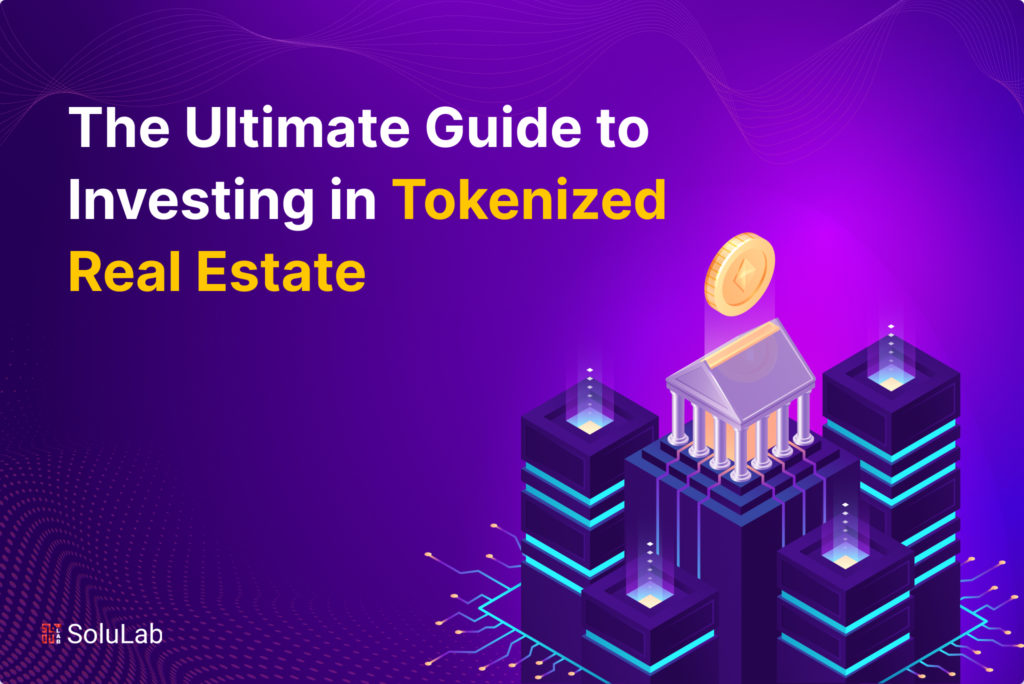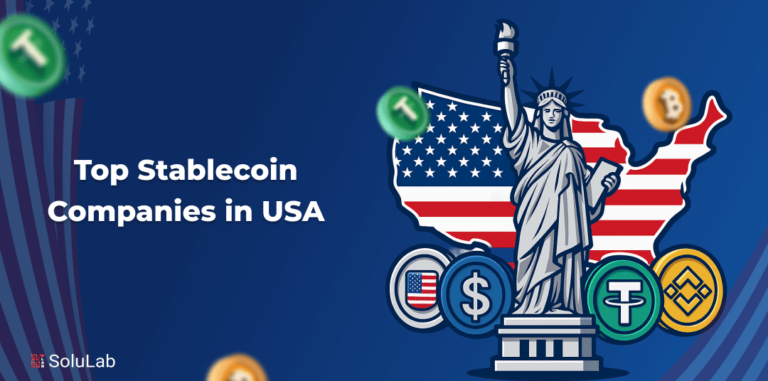
For a very long time, investors have found real estate to be among the most alluring investment opportunities. The conventional negatives of real estate investing, however, continue to exist, and there haven’t been any notable adjustments. But given that tokenization is here to address and resolve these problems in the real estate sector, it won’t endure for much longer. tokenized real estate companies will greatly increase transparency and flexibility in real estate investing, supported by blockchain technology & smart contracts.
You might be wondering at this point how real estate tokenization functions and whether it really has a long-term future. But don’t worry; we’ll cover everything related to tokenized real estate in this blog. Therefore, let’s begin.
Tokenized Real Estate in Brief
Real estate has traditionally been defined as an illiquid asset. It has always required a significant expenditure and a drawn-out legal & financial process to buy and sell. There are various real estate tokens that can be used to denote the ownership and value of the in-question property, whether it’s residential or commercial. The rights and liabilities attached to any piece of real estate are represented by a token.
A smart contract holds the details of every real estate token. As a result, any transaction involving the tokenized real estate in issue can happen instantly and automatically if a contract provision permits it. Anyone who purchases a real estate token related to the property will now possess a portion of the actual real estate in question. That implies that they are accountable for any loss it experience as well as any gains that result from the transfer of ownership.
As soon as you understand the idea of their ownership, the opportunities expand almost instantly. Each of us may think of a sizable industrial property or a sizable commercial district that could potentially benefit from the use of real estate tokenization. Let’s now look more closely at how tokenized real estate can benefit individuals who own it and those who invest in it.
Different Types of Real Estate Tokenization

Real estate tokenization mostly has three types. So let’s examine each one in turn.
-
Residential-type Real Estate Tokenization
The practice of tokenizing a residential real estate property is known as residential real estate tokenization. The fact that investors can own a portion of residential property anywhere in the world from the comfort of their homes makes this type the most popular among the others.
-
Commercial-type Real Estate Tokenization
The tokenization of commercial real estate is very similar to that of residential real estate. Tokenizing commercial real estate properties are involved. But in this case, special care must be taken to guarantee that all legal requirements are completed and that the business property is not subject to any criminal activity.
-
Trophy-type Real Estate Tokenization
The most recognizable kind of real estate tokenization is trophy tokenization. It is the practice of tokenizing prominent, upscale venues that are extremely significant & prestigious in both terms of money as well as their intrinsic value.
How Tokenized Real Estate Investing Works
Special purpose investment vehicles, which are often set up as limited liability corporations (LLCs), are used to invest in real estate in both conventional and tokenized deals. The ownership of the LLC is fragmented into security tokens for real estate transactions based on blockchain technology.
The creation of public security is a complex and expensive process, and since the offering is a security, it is typically registered under an exemption.
The creation of a private placement offering (PPM) that includes information on the investment’s nature, potential risks, sponsors, and other pertinent factors is one criterion for gaining the exemption. The SPV’s operating agreement and subscription agreement both outline the managers’ and investors’ responsibilities as well as the rights and obligations of both parties.
Read Our Blog Post: Top 12 Real Estate Tokenization Companies in USA
To maintain compliance with securities laws, real estate tokens are coded by the underlying smart contracts. Smart contracts have the ability to automatically enforce any buy and sale limitations required by the world’s securities authorities. Smart contracts can also be used to impose restrictions regarding who can buy tokens and holding periods for those tokens.
Real estate tokenization platforms conduct know-your-customer (KYC), anti-money laundering (AML), and investor accreditation checks in order to enforce these requirements. These examinations lead to the “whitelisting” or pre-approval” of specific buyers.
Processes Involved in Tokenized Real Estate Properties

Structuring the Deal
The categories of shareholders & assets, the applicable jurisdiction, and the pertinent legislation are all significant considerations in this first step. Prior to raising capital to launch a new business, issuers frequently decide to tokenize a prior deal at this stage, largely to give liquidity to current investors.
Digitization
Information that was previously stored in paper/document form is uploaded to the blockchain at this point. This procedure makes use of smart contracts, and the kind of fund/fund structure is also chosen. The following are the most popular fund structures:
The most common fund structures are as follows:
- Real Estate Investment Trust (REIT)
- Real Estate Fund
- Single asset Special Purpose Vehicle (SPV)
- Project Finance
Read Our Blog: What is Real Estate Tokenization and How Does it Work?
Selection of Technology
At this stage, a number of crucial technological choices can be taken, including:
-
Choose Blockchain
Given that the transaction will be added to the blockchain ledger, it is important to choose the appropriate blockchain depending on your requirements and requirements.
-
Chose Custody Solution
It is necessary to choose a custody solution that can hold real estate tokens securely and safely.
-
Chose Marketplace
It is necessary to choose the marketplace where investors can purchase real estate tokens. Depending on your company’s needs, you can select either a primary or a secondary market.
Read Also: What is the Future of Crypto Real Estate?
Marketing & Distribution
The creation & distribution of tokens are indeed the primary areas of concentration at this stage. Real estate tokens can be purchased using a number of different payment methods, such as stablecoins, cryptocurrencies, fiat money, and others. These tokens are available to investors through:
- Primary Distribution
- Secondary Trading
Additional Support
A real estate tokenization company now provides additional support to investors, such as developing a corporation code and helping with legal and mortgage issues.
Tokenization Advantages for Real Estate Owners
Real estate owners, sponsors, as well as investors can all gain from tokenization. The following are some of the main benefits for sponsors & owners:
- Tokenization gives real estate ventures exposure to plenty of investors. A real estate project might not even be known to many investors until it is tokenized. A real estate tokenization platform inevitably increases marketing and awareness, enhancing sponsors’ access to financing.
- In addition to automating investor communications, payouts, purchases & sales, tax accounting, as well as (where necessary) investor voting, smart contracts that underpin real estate tokens can also automate compliance with securities legislation. Real estate sponsors can handle numerous investors with the help of automation, which also creates a robust audit trail across all property actions.
Check Our Blog Post: 15 Blockchain Companies Shaping the Real Estate Industry
- Tokenization enables sponsors to provide investors with more liquidity, potentially improving investor returns and enabling investors to reallocate funds to the sponsor’s upcoming deal. Sponsors may immediately profit from increased liquidity among investors.
- A real estate owner may use tokenizing an asset to resolve complex problems like how to terminate a partnership or distribute an estate among heirs. Real estate token owners are free to decide whether to buy, sell, or leave at any time. Tokenization, while not resolving every property-related conflict, can assist with many potential issues.
- Numerous new possibilities for using and maintaining a property’s equity are made possible by tokenization. Real estate owners who tokenize their properties can raise short-term financing, receive debt secured by their tokens, sell a portion of the equity (perhaps with a buyback option), and exchange their real estate tokens for other tokens.
Disadvantages of Tokenizing Real Estate
Sponsors do need to change the way they approach real estate because of tokenization. For sponsors of tokenized real estate, the following cons might be present:
- Many operations are automated by tokenization, which may worry sponsors who like complete anonymity and control.
- Sponsors might be concerned about losing a dependable investment base now that investors can swap tokens more readily. However, strong sponsors can continue to work with investors, plus their track record might even help them draw in more money. Additionally, there are programs for rewarding devoted investors (like early purchase, for instance), which help sponsors build and expand their own investor base.
- Managing more investors may intimidate some sponsors because it necessitates a variety of communication strategies. Sponsors might make use of a real estate tokenization platform’s assistance to keep investor communications going at scale.
- Sponsors must establish and uphold rigorous guidelines regarding the information that is disclosed to investors as well as the secondary market. Primary investors need in-depth information, which might not be suitable for a wider audience. A good tokenization platform will make these restrictions easier and more automated, assisting sponsors in finding the ideal harmony between privacy and openness.
What is the Future of Real Estate Tokenization?
You might be surprised to learn that the real estate investing industry has a far larger market than a number of other businesses. In comparison to other investment vehicles like equities, mutual funds, and bonds, it is also regarded as a safe investment. But some of the market’s elite participants, who are significantly wealthier than others, control it. Real estate tokenization is therefore not only urgently needed but also has the enormous potential to completely transform the sector. Additionally, according to Prophecy Market Insights, tokenization income in the global real estate market will soar and reach $4.3 billion over the course of the following five years. The future of real estate tokenization thus appears to be quite promising based on the aforementioned points and the unmistakable numbers.
If You Need Help
Our company, SoluLab, is a market leader in blockchain development. Our team members are highly skilled and experienced in creating real estate tokenization solutions. You may securitize real estate, raise money more quickly, and reach a wider audience of investors with the assistance of our highly qualified team. Consider your options even now. Get in touch with us so that we can address all of your questions.
Conclusion
SoluLab offers a comprehensive range of real estate tokenization development services, guiding individuals through the complex landscape of property investment and development. Whether one is a property owner seeking capital through tokenization or an investor looking to diversify, SoluLab paves the way for the future of real estate investment. Their team of dedicated professionals is committed to delivering top-tier tokenization solutions, unlocking the full potential of real estate assets. SoluLab provides a tailored white-label real estate tokenization solution, supporting multiple blockchains, to redefine the experience of trading tokenized real estate. By launching a white-label platform, clients can establish a digital presence in the crypto trading world, offering a space to list commercial or residential property tokens and configure prices as desired. To embark on this transformative journey, contact SoluLab today.
FAQs
1. What is investing in tokenized real estate?
Real estate with a fractionalized ownership structure based on blockchain technology is known as tokenized real estate. Tokenized property investing is structurally identical to purchasing real estate through a syndicated transaction.
2. What is the price of tokenizing real estate?
Legal, governing, and technological costs are typically incurred during the process. Tokenizing a property typically costs between $30,000 and $100,000. Including legal costs, developing a blockchain, smart contract implementation, and regulatory compliance.
3. Is tokenization in real estate the way to the future?
The future of real estate tokenization, which will be driven by blockchain technology and smart contracts, presents a tremendous opportunity for expansion, with the ability to improve stability and accessibility through rational ownership.
4. What is the process of investing in tokenized assets?
Firstly, you would be required to select the asset and the regulation that is put into the asset. Afterward, select a platform and proceed with the organization process. Once this is complete, search for investments and acquire, and invest investments. Put your attention on the plants and strategies, after which you should take care of trading and liquidity.
5. How to buy tokenized real estate?
To buy tokenized real estate select a trustworthy platform or marketplace before purchasing tokenized real estate. Make an account, finish the KYC process, and add money to your wallet using Bitcoin or Fiat. Choose a tokenized asset from the list of available properties, then by tokens that represent fractional ownership.
6. How can SoluLab help you with the tokenization of real estate assets?
In the field of real estate tokenization, SoluLab specializes in the process of transforming real estate assets with digital tokens that are stored on a blockchain. This procedure makes it possible to have fractional ownership, improves liquidity, and expands access to investment opportunities.






